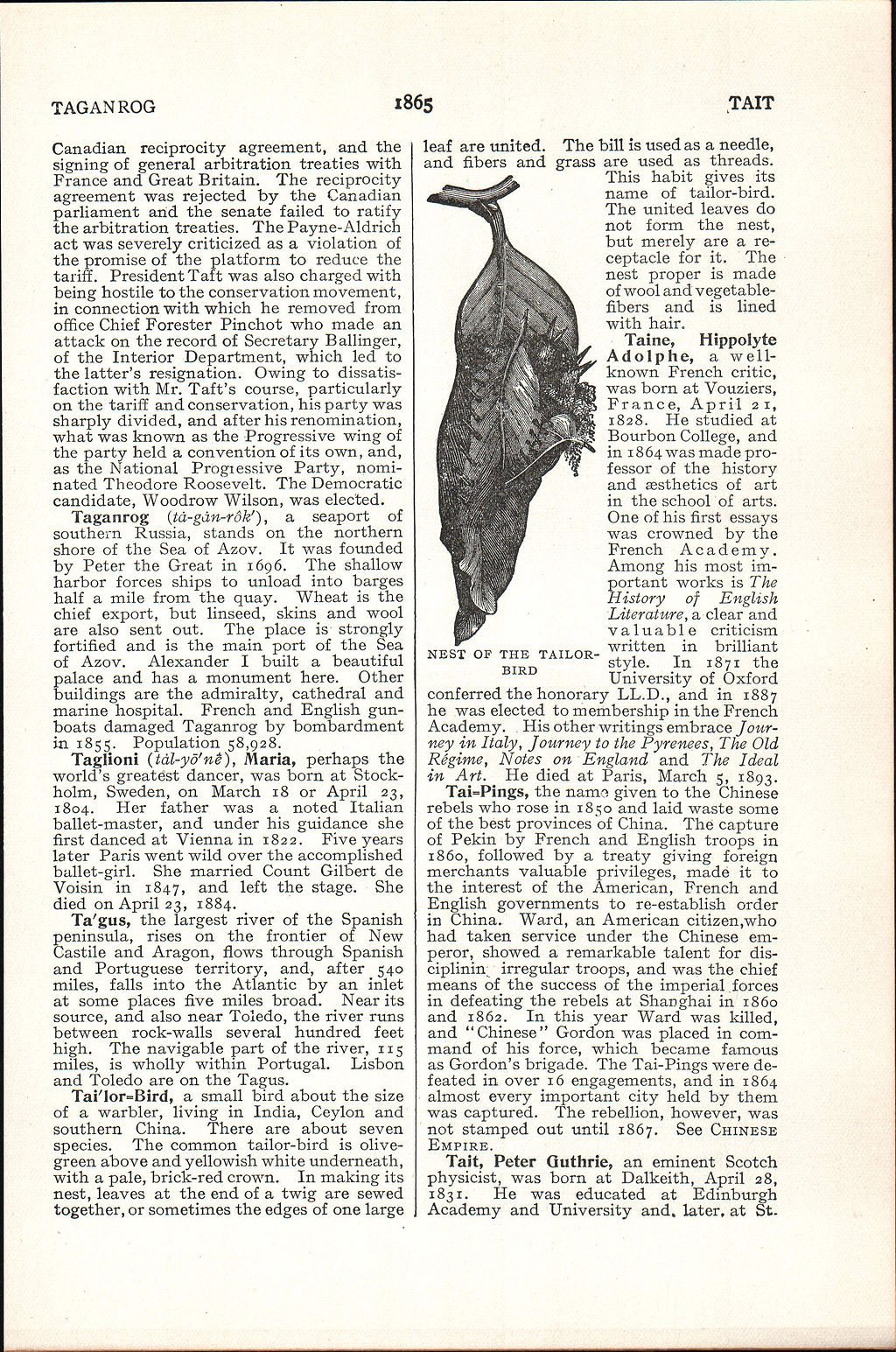Page 1865 : TAGANROG — TAIT
Individual articles:
Canadian reciprocity agreement, and the signing of general arbitration treaties with France and Great Britain. The reciprocity agreement was rejected by the Canadian parliament arid the senate failed to ratify the arbitration treaties. The Payne-Aldrich act was severely criticized as a violation of the promise of the platform to reduce the tariff. President Taft was also charged with being hostile to the conservation movement, in connection with which he removed from office Chief Forester Pinchot who made an attack on the record of Secretary Ballinger, of the Interior Department, which led to the latter’s resignation. Owing to dissatisfaction with Mr. Taft’s course, particularly on the tariff and conservation, his party was sharply divided, and after his renomination, what was known as the Progressive wing of the party held a convention of its own, and, as the National Progressive Party, nominated Theodore Roosevelt. The Democratic candidate, Woodrow Wilson, was elected.
Taganrog (tȧ-gȧn-rôk′), a seaport of southern Russia, stands on the northern shore of the Sea of Azov. It was founded by Peter the Great in 1696. The shallow harbor forces ships to unload into barges half a mile from the quay. Wheat is the chief export, but linseed, skins and wool are also sent out. The place is strongly fortified and is the main port of the Sea of Azov. Alexander I built a beautiful palace and has a monument here. Other buildings are the admiralty, cathedral and marine hospital. French and English gunboats damaged Taganrog by bombardment in 1855. Population 58,928.
Taglioni (tȧl-yō′ nḗ), Maria, perhaps the world’s greatest dancer, was born at Stockholm, Sweden, on March 18 or April 23, 1804. Her father was a noted Italian ballet-master, and under his guidance she first danced at Vienna in 1822. Five years later Paris went wild over the accomplished ballet-girl. She married Count Gilbert de Voisin in 1847, and left the stage. She died on April 23, 1884.
Ta′gus, the largest river of the Spanish peninsula, rises on the frontier of New Castile and Aragon, flows through Spanish and Portuguese territory, and, after 540 miles, falls into the Atlantic by an inlet at some places five miles broad. Near its source, and also near Toledo, the river runs between rock-walls several hundred feet high. The navigable part of the river, 115 miles, is wholly within Portugal. Lisbon and Toledo are on the Tagus.
Tai′lor-Bird, a small bird about the size of a warbler, living in India, Ceylon and southern China. There are about seven species. The common tailor-bird is olive-green above and yellowish white underneath, with a pale, brick-red crown. In making its nest, leaves at the end of a twig are sewed together, or sometimes the edges of one large leaf are united. The bill is used as a needle, and fibers and grass are used as threads. This habit gives its name of tailor-bird. The united leaves do not form the nest, but merely are a receptacle for it. The nest proper is made of wool and vegetable-fibers and is lined with hair.
Taine, Hippolyte Adolphe, a well-known French critic, was born at Vouziers, France, April 21, 1828. He studied at Bourbon College, and in 1864 was made professor of the history and aesthetics of art in the school of arts. One of his first essays was crowned by the French Academy. Among his most important works is The History of English Literature, a clear and valuable criticism written in brilliant style. In 1871 the University of Oxford conferred the honorary LL.D., and in 1887 he was elected to membership in the French Academy. His other writings embrace Journey in Italy, Journey to the Pyrenees, The Old Regime, Notes on England and The Ideal in Art. He died at Paris, March 5, 1893.
Tai-Pings, the name given to the Chinese rebels who rose in 1850 and laid waste some of the best provinces of China. The capture of Pekin by French and English troops in 1860, followed by a treaty giving foreign merchants valuable privileges, made it to the interest of the American, French and English governments to re-establish order in China. Ward, an American citizen, who had taken service under the Chinese emperor, showed a remarkable talent for disciplining irregular troops, and was the chief means of the success of the imperial forces in defeating the rebels at Shanghai in 1860 and 1862. In this year Ward was killed, and “Chinese” Gordon was placed in command of his force, which became famous as Gordon’s brigade. The Tai-Pings were defeated in over 16 engagements, and in 1864 almost every important city held by them was captured. The rebellion, however, was not stamped out until 1867. See Chinese Empire.
Tait, Peter Guthrie, an eminent Scotch physicist, was born at Dalkeith, April 28, 1831. He was educated at Edinburgh Academy and University and, later, at St.
Image: NEST OF THE TAILOR-BIRD
